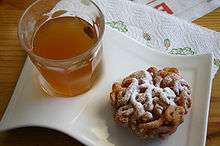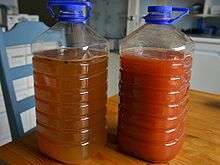Sima (mead)


Sima was originally mead, an alcoholic beverage produced by brewing a solution of honey and water. Nowadays the honey is usually replaced mostly or entirely by different kinds of sugar and there is only a very low alcohol content due to limited fermentation. Sima is nowadays therefore a sweet sparkling brew that is mainly seasonal and connected with the Finnish Vappu festival. It is usually spiced by adding both the flesh and rind of a lemon. During secondary fermentation, raisins are added to control the amount of sugars and to act as an indicator of readiness for consumption — they will swell by absorbing carbon dioxide and rise to the top of the bottle when the drink is ready. Sima is usually accompanied by a munkki (donut), a tippaleipä (a special Vappu funnel cake), or a rosetti (rosette).
Sima's ingredients include lemon, active dry yeast, and raisins. Sugar is added as brown sugar, white sugar, honey or some combination of them. Hops are also called for in some recipes. The concoction of water and the lemon and sugars are mixed, boiled, and cooled to room temperature. The yeast is added and the mixture left to stand overnight. Then it is carefully decanted into bottles and a few raisins are added to each bottle.
The sima will be ready to drink when the raisins rise to the top of the bottles, about three to seven days depending on the temperature of the room where they are stored. It is usually served chilled. Usually, the alcohol content is low and the drink is suitable for children. Carbonation is produced by the yeast, and the drink is traditionally cloudy and not clarified or filtered. Because of this, traditional sima is a fresh product that does not store for long because fermentation may continue in a bottle and the alcoholicity may rise.
A commercial and possibly foreign cheap "sima" is produced by mixing apple wine, grape juice and flavor with carbonated water; this doesn't produce the soft flavor of traditional fermented sima.
References
| Wikibooks Cookbook has a recipe/module on |